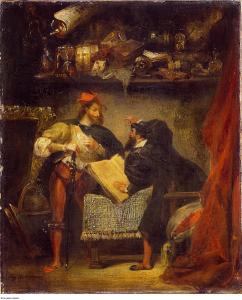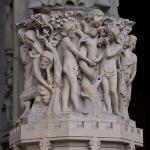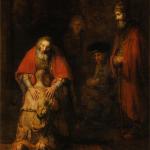
We learn a great deal about ourselves from our metaphorical accounts of deities and devils. Do these accounts prove life-giving or deadly for others and ourselves?
Friedrich Nietzsche was one of the great critics of religion, along with Sigmund Freud, Karl Marx, and Ludwig Feuerbach. Nietzsche wrote about truth as a dead metaphor. In “On Truth and Lying in an Extra-Moral Sense,” Nietzsche asserts: “Truths are illusions about which one has forgotten that this is what they are.”[1] Nietzsche argued that the doctrine of the crucified God is the most deadly or harmful teaching ever taught by humanity. From his vantage point, it esteems the weak, the mediocre, the pitiful elements of society. Regardless of what we think of Nietzsche’s point about truth, or his view of God, some metaphors dead or alive, are rather quite deadly.[2]
C.S. Lewis makes this point in The Screwtape Letters when discussing concepts of the devil. No matter how dangerous dead metaphors might be for our approach to reality, there is nothing more dangerous than deadly metaphors, such as the devilish character Mephistopheles in Goethe’s Faust. Lewis speaks of Mephistopheles as “humourous, civilized, sensible, adaptable.” Lewis proceeds to claim that this literary figure “has helped to strengthen the illusion that evil [is] liberating.”[3]
As stated at the outset of this post, one trait that we find in analyses of deities and devils is how they reflect human life in some manner. All too often, our views of the divine and the demonic are projections of human traits we esteem. For Nietzsche’s fellow master of suspicion, Feuerbach,
Theology is anthropology; in other words, the object of religion, which in Greek we call theos and in our language God, expresses nothing other than the essence of man; man’s God is nothing other than the deified essence of man, so that the history of religion or, what amounts to the same thing, of God—for the gods are as varied as the religions, and the religions are as varied as mankind—is nothing other than the history of man.[4]
Lewis would contend against the idea that Christianity is simply a human projection onto the infinite void. However, he does claim that his discussion of devils in Screwtape Letters is intended “to throw light from a new angle on the life of men.”[5]
What do we learn about ourselves when reflecting on our deities and demons? Lewis’s conception of the demons and Hell sheds light on how we humans often live. One of Lewis’s metaphorical demons writes to another demon:
To us a human is primarily food; our aim is the absorption of its will into ours, the increase of our own area of selfhood at its expense. But the obedience which the Enemy demands of men is quite a different thing. His love for men, and His service being perfect freedom, is not (as one would gladly believe) mere propaganda, but an appalling truth. He really does want to fill the universe with a lot of loathsome little replicas of Himself—creatures whose life, on its miniature scale, will be qualitatively like His own, not because He has absorbed them but because their wills freely conform to His. We want cattle who can finally become food; He wants servants who can finally become sons. We want to suck in, He wants to give out. We are empty and would be filled; He is full and flows over. Our war aim is a world in which our Father Below has drawn all other beings into himself: the Enemy wants a world full of beings united to Him but still distinct.[6]
The demons, like the Devil, want to suck the life out of us. God revealed in Jesus pours out and fills us with worth and dignity. What Nietzsche might find as weak and foolish about Christianity is what Lewis prizes as powerful and profound. It is only weak and impotent humans who have to strive to fill themselves up in isolation and quite possibly at the expense of others. God is so full of life that he can flow over to fill others.
Hell, on Lewis’s view, looks very much like how we so often live—Christian and non-Christian alike. He writes, “We must picture Hell as a state where everyone is perpetually concerned about his own dignity and advancement, where everyone has a grievance, and where everyone lives the deadly serious passions of envy, self-importance, and resentment.”[7]
What do we learn about ourselves from our metaphorical accounts of deities and demons? What do these concepts tell us of what we find delightful and disgusting, full of life and deadly? How then shall we live in view of them?
_______________
[1]Friedrich Nietzsche, The Portable Nietzsche, ed. Walter Kaufmann (New York: Penguin Books, 1982), 46-47.
[2]Friedrich Nietzsche, The Antichrist, in The Portable Nietzsche, ed. Walter Kaufmann (New York: The Viking Press, 1968), 633-644.
[3]C. S. Lewis, The Screwtape Letters, rev. ed. (New York: Macmillan Publishing Company, 1961, new preface, 1982), p. ix.
[4] Ludwig Feuerbach, Lectures on the Essence of Religion (Eugene, OR: Wipf & Stock Publishers, 2018), 17.
[5]Lewis, The Screwtape Letters, xii.
[6]Lewis, Screwtape Letters, 37-38.
[7]Lewis, Screwtape Letters, ix.














